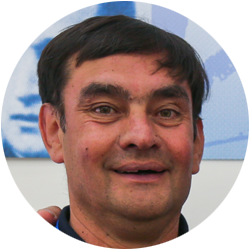Zatti,
saint
A gift for the People of God who suffer, believe, and trust
Artemides with a macrocephalic child, whom he cared for until the day of his death, and internal children. 1940.
01.
Migrant
02.
Believer
03.
Salesian
04.
Nurse
05.
Saint
What is the first thing we think of when we say “saint or holy”? What images come to mind, what do we associate “sainthood or holiness” with? No doubt we will encounter a plurality of ideas, experiences, and memories. But as believers, it is good to go to the source, to the Word of God. There it is possible to find a beautiful web or pattern of encounters, searches, joys, and challenges between God’s initiative and the free response of the human being.
“Be saints as I am a saint”
Being saints is a gift, a gift to answer to, to value, and welcome. Another expression of God’s holiness is manifested in mercy. God is merciful; it is He who comes to meet and enable people in that loving and filial dialogue that leads to wholeness. Naturally, everyone goes his or her own way, giving the best of themselves. Br. Zatti used to tell his colleagues and patients, “We must give the best of ourselves to Jesus.”
This holiness or sainthood is fulfilled in the experience of being the People of God, animated by the Holy Spirit, the soul of all the spiritual wealth that renders the values of the Kingdom of God present. The saints are members of the People of God who accompany their pilgrimage to the eternal. The reality of being a “people” is very interesting: it is in this context that we experience achievements, moments of joy and peace, but also pain and sadness, through illness, loss of loved ones, or the harshness of poverty.
Like Zatti, testimonies of joy and humor.
We can discover that to be saints is to live a strong and rich experience of encountering God’s Love, which liberates and brings to fulfillment the deepest desire to love, that is, to be happy. To be a saint means to allow oneself to be embraced in one’s littleness by God’s merciful love, which calls everyone to be happy. By God’s free and loving initiative, everyone is invited to be a saint.
Sometimes we may have the idea that a saint is a sad, lonely, melancholy person who lacks energy and passion… On the contrary! Pope Francis says, “The saint is capable of living with joy and a sense of humor. Without losing realism, he enlightens others with a positive and hopeful spirit.” (Gaudete et Exultate, 122).
Zatti’s sainthood is a clear expression of the spiritual path proposed by St. Francis de Sales and taken up by St. John Bosco for his pastoral educational project at the service of poor young people. A spiritual path or journey, with the proposal of holiness for all, living with joy and profound trust in God’s providential Love. Zatti summed it up in this beautiful expression, “How can we not always smile, if God loves us so much!”
Love and care for all
Zatti is one of the people: everyone feels him as one of them, which is why he has been called “relative of all the poor.” His presence among the people of the district of Viedma and Carmen de Patagones conveys joy and serenity. He is a presence that shortens distances. A brother who goes out to meet his neighbors.
In his actions, whether in the San José Hospital or in the Salesian community, his joy and goodness irradiate, which generate a serene sympathy. Everyone feels at ease when they meet him. He pays attention to everyone. His bicycle becomes a sign of this going out to meet others and shortening distances. In his heart as a Salesian and nurse, everyone is important, and he “multiplies” himself to reach out to everyone and serve Jesus in every suffering person, in every one of his neighbors.
He knows how to communicate with everyone, has a gesture for the children, a joke, or a word of encouragement for each one. Simple people and the poor are the first to grasp his spiritual stature. It is the same people of the neighborhood who feel accompanied and cared for by Zatti’s charitable heart: they consider him a saint.
“One must know how to swallow bitter and spit out sweet.”
Zatti experienced in his life story the hardships and pains of poverty and illness. He and his family had to emigrate in search of a better life. They arrive leaving their land, their people, carrying in their hearts the sadness of those who must leave their place, but also the strong hope of a world with more opportunities.
His story, embraced with faith, shapes him and prepares him to be medicine among so many sick and poor brothers and sisters. His path will enable him to have a compassionate and fraternal heart for all, especially the suffering. His smile, words, and gestures become a medicine that encourages and strengthens. When asked about the difficulties and problems he faced, he would say, “We must know how to swallow bitter and spit sweet,” an expression of one who embraces and finds in the cross the strength to be a manifestation of God’s love for others.
Zatti, a saint, is a clear gift from God to his people. The poor, the sick, and the suffering find in him a brother who is close, understanding, and solicitous in helping and assisting them in their encounter with God and His grace. Zatti not only healed the body but, as a man of faith and a good Christian, helped his neighbors grow in faith.
Zatti, “a saint in life”
As told by those who testified at the beginning of the process of his cause for beatification, even during his lifetime the entire population had high regard and appreciation for the nurse.
A clear expression of this was the response of the population to his funeral. The whole city mobilized to accompany the funeral procession. Feliciano López reported it this way, “The accompaniment to the cemetery was impressive. The coffin was accompanied by Msgr. Borgatti, government and municipal authorities, who had ordered the closure and suspension of all public offices. The funeral director organized a first-class service. At the end of the service, the Provincial offered everyone the task of collecting testimonies, memories, and anecdotes to prepare a biography.”
Today, devotion to Zatti is expressed simply and serenely. In this time when so much has been suffered because of the pandemic, and when health and its servants have gained so much importance, Br. Zatti comes across as a caring and effective intercessor. There are many who, in different ways, approach and ask for the intercession of the nurse, who also suffered the disease, firsthand, during his lifetime.
1934
Zatti travels to Rome, Italy, to participate in the canonization of Don Bosco, as a delegate of the Salesian brother coadjutors.
1947
Don Zatti testifies in the canonization process of Ceferino Namuncurá.
1951
After falling from a ladder the previous year, the symptoms of a tumor appear. On March 15, Zatti dies of cancer. The whole town participates in his funeral.
1953
El salesiano Raúl Entraigas finaliza la primera biografía de Zatti, y la más famosa: “El pariente de todos los pobres”.
1956
The Salesian Raúl Entraigas finishes the first biography of Zatti, and the most famous: “The relative of all the poor”.
1977
The bishops of Argentina ask the Pope to start the process to declare him a saint.
2002
Pope John Paul II declares Zatti Blessed of the Catholic Church.
Originally published in the Salesian Bulletin of Argentina.

Pedro Narambuena, sdb
Salesian. Priest. Argentina.
Vice-postulator of the cause of Artemide Zatti, Rector of the Salesian community of Viedma – Carmen de Patagones, Director of Ceferino Misionero publishing house
